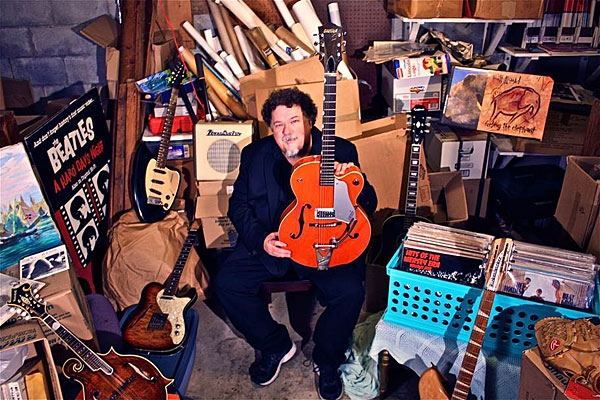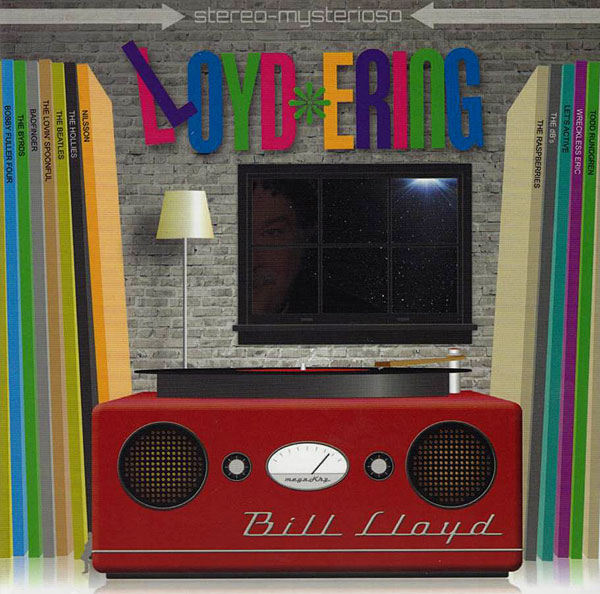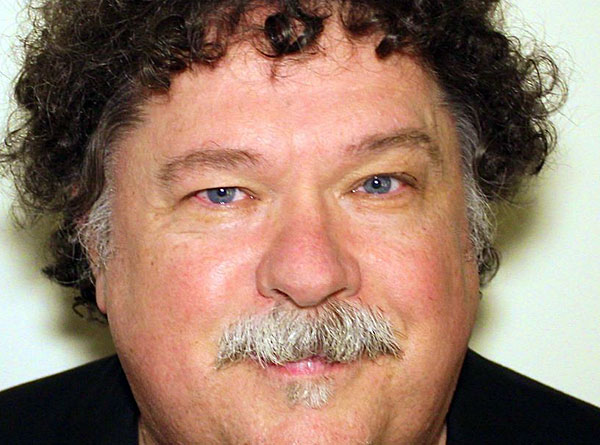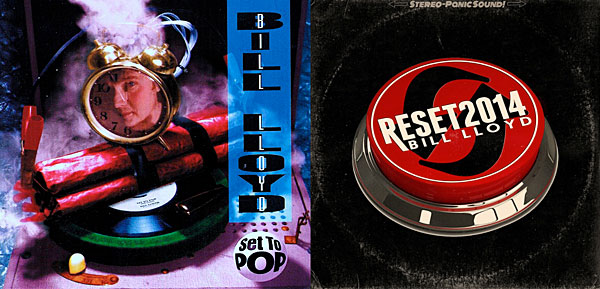| Columns Retired Columns & Blogs |
Thanks for this.

At the risk of breaking that rule, I must note that there are small victories along the way that, while doing nothing to change the inviolable facts listed above, can provide a brief smile and some small measure of satisfaction. Chief among those wins for me was the moment in 1998 when Stereophile contributing music editor David Sokol and yours truly, each without knowing what the other was doing, both chose Bill Lloyd's 1994 album, Set to Pop, as one of our "Records To Die For" for 1998. That's never happened since. This on top of the fact that we both wrote rave reviews of the record when it first came out. Though flattered, guitarist and singer-songwriter Lloyd had to scramble when his website's e-commerce page was deluged with orders. As legend had it, he belatedly found out that his label, East Side Digital, had only a few CD copies of Set to Pop on hand. Because of the R2D4 double team, Lloyd and his label had to press another run of CDs to meet the sudden demand. Although it hadn't been our intention, we'd succeeded in putting a record back into print!
"I remember at the time reading what you and David wrote," Lloyd recently told me, "and it was over the top! One of you said something like, 'It's in the upper echelons with Pet Sounds and Zuma,' and I went, 'Holy shit!'"
Containing such crystalline pop gems as "Channeling the King," "In a Perfect World," "A Beautiful Lie," and "Trampoline," Set to Pop will always be one of the great undiscovered masterpieces of the '90s. But Lloyd, who was once half of the successful late-'80s mainstream country duo Foster and Lloyd (with Radney Foster), has continued to make records since 1994, all of them enjoyable, and all nearby the genre of power pop. From his debut album, Feeling the Elephant, released by Throbbing Lobster in 1987, Lloyd, to quote a later song of his, "went electric."

Now, as a sort of history of the genre and a telling look into his influences, he's released Lloyd*Ering—a compilation of his appearances on 12 tribute records, most of which were dedicated to practitioners of sweet, hooky pop led by (mostly) male vocal harmonies and chiming guitar chords—in other words, power pop. Lloyd, who has a strong, high voice and a penchant for playing ringing parts on hollow-body Gretsch electrics, was a highlight of all these projects. As reference points, the better bands—and it's always bands, not solo acts—that play power pop include XTC, Cheap Trick, Plimsouls, Raspberries, dB's, Tommy Keene, Posies, New Pornographers, and Fountains of Wayne. The PP game is all about writing and recording that elusive but sticky and unforgettable hit single. PP albums tend to be spotty.
"The term actually came from Pete Townsend," Lloyd said from his home in Nashville. "He coined it first in an interview. He said, 'What we do is kind of power pop.' I've always thought he was right: they put a loud backing to a very pop . . . the melodies and the harmonies were very smooth, while the underbelly was rock'n'roll, a big sound. A lot of people think it kind of started with Badfinger, or Big Star, which of course I also love. But the first power-pop things, to me, were the Who's 'I Can See for Miles' and 'The Kids Are Alright.'"
It could be argued that power pop reached its pinnacle as one facet of the genius and music of the Beatles. George Harrison and Paul McCartney both wrote and played perhaps the best examples of power pop ever created. "'Eight Days a Week'? C'mon, that's power pop to me," Lloyd said. "Certainly, 'Paperback Writer.' You get the beefy bottom with the cream on top. The Who, the Kinks—you go back to an era where pop songs were just exploding with goodness. There was a golden time—not that there isn't great music being made now—but it really was a golden time. Hence, a lot of the songs on this record are from that era, and the '70s."
Lloyd turned 60 this year, and while he's spent half his songwriting and performing life making power pop, and the other half writing songs for such country performers as Sara Evans and Trisha Yearwood (as well as performing with Foster and Lloyd), the singer-songwriter has a bit of an uneasy relationship with PP. Though often dismissed as fluff, classic power pop sounds like Mozart or Irving Berlin compared with the random chords and loud beats that pass for pop today. PP can also suffer from comparisons to the past. "Paperback Writer," "Ticket to Ride," and a slew of numbers that once resided with Northern Songs Ltd., are impossible to equal. Finally, a lot of musicians, especially in the rock field, think of power pop as lacking in huevos—as a singles-only genre that's sweet, glandular teen mush.
"Unless you're talking to someone who's already converted and loves that sound, there tends to be a dismissive attitude," Lloyd admitted. "A lot of power pop music can be limiting. Bands that play lots of power pop tend to lure people more for the sound than the songs. And I'm all about the songs. I like songs for their structure, and the tension and release, and that goes for both music and lyrics. I really just like how a well-written song is put together, and that satisfaction you get as it unfolds. To me, power pop tends to be more about a retro image and a retro stance, and a throwback in terms of sound and recording.
"I love a lot of power pop, I fully admit it, but I like to put real songs in the heart of it. If I had any sort of musical mission, it would be to put really good songs to that format, that genre."

An all-covers record can be thought of as a treading-water project, especially one whose every track has been previously released (though most of the albums they originally appeared on are now out of print or hard to find). But Lloyd*Ering can also be seen and heard as a musical autobiography of Bill Lloyd—his musical heritage writ large, and by his own hand.
Opening with a suitably buoyant version of the Bobby Fuller Four's "Let Her Dance," Lloyd*Ering continues through a cover of the Byrds' "The World Turns Around Her" before moving on to "Lonely You," a charming number with an irresistible chorus of descending chords, by one of the bands most often cited as being power pop: Badfinger.
"Pete Ham or Wreckless Eric [whose "Whole Wide World" is covered later on Lloyd*Ering], I think it just sort of springs out of them—they have a connection to the music. But not every song. There are albums and albums by Wreckless Eric, or Badfinger, but the songs that really poke out, that have the biggest hooks, they just kind of fall naturally. You have to scoop through a bunch of them to find the ones that are the best."
After covers of "Step Inside" (Hollies), "The Lottery Song" (Harry Nilsson), and "Goin' Nowhere Tonight" (Raspberries), Lloyd turns to two tribute covers he cut for records celebrating the dB's ("Neverland") and Let's Active ("Every Word Means No"), both acknowledging the seminal role that the Chapel Hill, North Carolina, area has played in the development of American power pop. Oddly enough, these nods to the Old North State meant that Lloyd was covering songs by artists who are also his friends and who remain very much alive.
"Yeah, Mitch Easter [of Let's Active] and the dB's . . . kind of weird. You do it in hopes that they like it. You hope they don't get offended by anything. Mitch actually told me how much he liked my version of 'Every Word Means No.' What's interesting about that is it was for an Australian tribute, and [dB's drummer] Will Rigby was here in Nashville at the time, playing with Steve Earle, and Will goes back a long time with Mitch. Faye Hunter was here at the time, too. Faye's not with us anymore, but she was the original bass player for Let's Active, so I felt almost like getting to record that track with the original artists, you know? It was almost like, excluding Mitch, sort of plugging in with his peeps."
Tribute albums, the profits from many of which are donated to charity, are a strange subgenre of the record business. In most cases, artists record their contributions in far-flung locations, and someone—hopefully, someone with ears and talent—eventually mixes everything together and brings a consistency to the final sound. Happily, the sound of Lloyd*Ering is good—at times, very good. Many cuts are one-man-band affairs, Lloyd playing and singing all the parts.
"I like it when people do something [on a tribute record] that's not an exact homage, you know—although I've been guilty of that myself. The Byrds track on this record is really close to the original. But, overall, I took liberties with arrangements and sounds and tried to put my own stamp on it. And I think that's why you do a cover: The song moves you, and then you want to put it in your thing—dip the sponge in and squeeze and see how it comes out. And when you do that, all the places you go as a musician, as a singer, get represented in the cover."

Perhaps the most crucial and often contentious part of making a tribute album is deciding which artist records which song. Compromises and acting like adults would seem to be the order of the day, but the negotiations can get heated. Among the tracks on Lloyd*Ering, "The Lottery Song," "The World Turns All Around Her," and "Across the Universe" were all Lloyd's first choices. That last track, of course, is a John Lennon song from the Beatles' Let It Be. When I suggested that it's hard to bring something new to the Beatles, Lloyd agreed. "I've always the loved the intro of 'Across the Universe.' I know the words without having to look at a lyric sheet. My arrangement is a little different from what they did."
In 2007, Lloyd landed another Beatles-centric gig, as a guitar-playing sideman to Cheap Trick when they did shows to celebrate the 40th anniversary of the release of Sgt. Pepper's Lonely Hearts Club Band by playing the album in its entirety. Lloyd appeared with Zander, Nielsen & Co. at Las Vegas, the Hollywood Bowl, and other one-off gigs. "I did a version of 'Something' on guitar in the opening segment that was pretty fun. That was in the early days of the Vegas show. Bun E. [Carlos] was still in the band at that point."
Out of that experience, Lloyd and Cheap Trick bassist Tom Petersson ended up writing a couple of songs together, including one called "Yesterday."
"I know, I know—the title. We couldn't think of anything that worked as well. Hopefully, there will be a clerical error at McCartney's publishing."
Since the 1994 release of Set to Pop, when Lloyd established his pattern of singing and playing almost everything on his records himself—"cheaper and faster," he says—he's also been releasing records on his own Whole In One label and selling them on his website, billlloydmusic.net. He followed the 2012 full length Boy King of Tokyo with The Day After Christmas, a four-song Christmas EP, and a single of "Miracle Mile" b/w "Yesterday." Best of all for Lloyd-O-Philes, he also released the excellent if esoteric Reset2014, a collection of outtakes, remixes, and live tracks, all previously unreleased, of the songs on Set to Pop. Lloyd calls it his "hey-look-I-survived-this-long, 20-year anniversary, self-congratulatory pat on the back to myself." For those bewitched by the original, Reset2014 is a significant and welcome broadening of the canvas of Set to Pop (footnote 1).
Over the last 10 years, in addition to making his own music, Lloyd has worked as a curator of stringed instruments at the Country Music Hall of Fame and Museum, in Nashville, where he's also been compiling a fascinating video project: interviewing many of the greatest Nashville session musicians while they're still with us. He's also spent nearly 20 years as part of the First Amendment Center at Vanderbilt University, where he's been helping to "give a civics lesson about why the First Amendment is important, but tying it all to music."
Lloyd has recently been writing songs with Duane Eddy, and has also been gearing up for another show with a longtime side project he clearly adores: The Long Players. Over the past 10 years he and this changing group of collaborators have staged, in several Nashville venues, shows that focus on a single classic rock album. Any proceeds from the door go to charity.
"We started it with Let It Bleed, back in 2004, and here we are all these years later, and we just did Highway 61 Revisited for the second time a couple weeks ago. Folks that played on the original records show up. Al Kooper came down to play on Dylan records. Bobby Keyes used to play with us when we'd do Rolling Stones records. Nothing is recorded. The real record is where the art lies—we're just having celebratory gigs. We don't want to turn around and resell somebody else."
The day after we spoke, Lloyd was off to Liverpool, UK, to play the latest edition of the International Pop Overthrow, a festival that began in Los Angeles in 1997 and has since spawned editions of itself all over the world. Excited about his first visit to Liverpool, Lloyd planned to pay an overdue homage to the ultimate icons of power pop.
"I can't wait to go and drink the Beatle juice!"